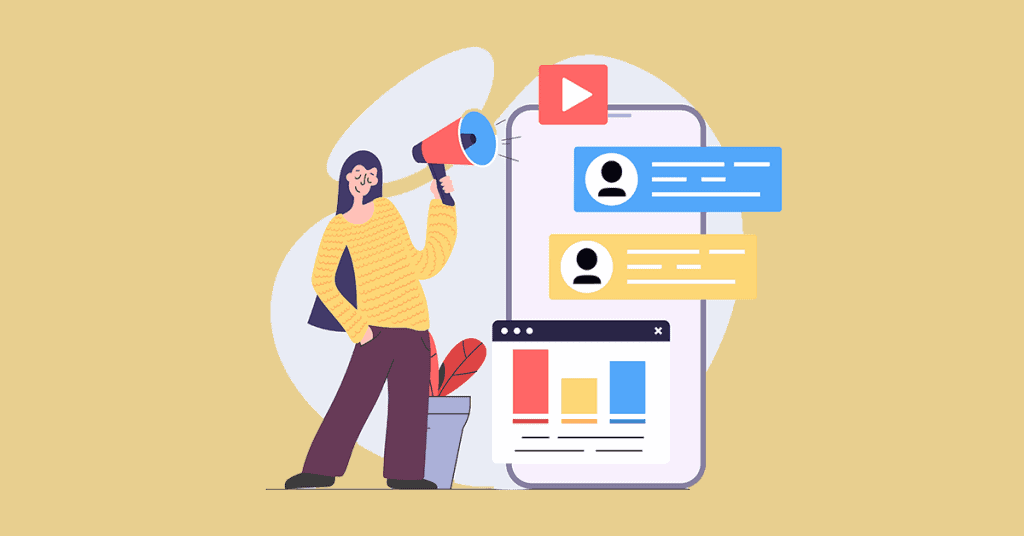Social media is becoming an unstoppable force influencing almost every facet of contemporary life in the digital age. Originally meant to be a tool for communication, what started as a strategy of linking people has evolved into a potent instrument for influencing consumer behaviour, thereby supporting social movements, impacting business practices, and even changing knowledge access. Social media shapes the digital terrain in public, personal, and professional spheres rather than acting just as a tool. The several methods in which social media is changing our surroundings as well as the effects of its broad influence on people and civilizations are investigated in this article.
The Rise of Social Media: A Digital Revolution
From neighborhood internet groups to international websites, social media has grown quickly. Among the first social networking sites were MySpace and Friendster, which gave users another online connection tool. But the 2004 arrival of Facebook marked the beginning of social media’s general appeal. Twitter, Instagram, LinkedIn, and TikHub have all helped social media evolve by providing fresh ideas and people.
The projected worldwide social media user count by 2024—more than 4.9 billion—keeps increasing as internet accessibility improves. Because of its rapid spread and effect on how people interact with content, brands, and one another, social media is becoming ever more important component of the digital infrastructure.
William Westerlund, SEO Expert at Tradeit says, “Social media platforms let users produce and distribute their own content, therefore encouraging a variety of points of view and ideas unlike those of conventional media. This has enabled social media to democratize knowledge and establish its indispensable role in the digital ecosystem of today.”
Shaping Consumer Behavior and Trends
Usama Alvi, Marketing Consultant at Alvi Consulting said that Consumer behaviour has been drastically altered by social media, impacting what people buy, where they spend, and even the underlying reasons of purchases. Social media actively interacts with consumers unlike conventional advertising, which focuses on predefined messaging. By means of likes, comments, and shares, platforms like Instagram and TikHub let customers engage with companies, therefore promoting two-way communication that builds connections and trust.
One pretty obvious approach social media influences consumer behaviour is influencer marketing. Since they enable followers consider these recommendations as real and relevant, influencers supporting companies and sharing their personal experiences help to boost conversion rates more than with conventional marketing. Studies reveal that 50% of purchases made depending on influencer recommendations. Social media algorithms also allow companies to reach their target market by customizing advertising and suggesting products to consumer tastes.
Still another important tendency is the component of “virality”. In the lack of much to no additional marketing, a single viral post can sometimes drive a company or product to exponential popularity. This issue has produced a dynamic whereby businesses have to remain relevant by actively engaging in digital conversations and maintaining current on social media trends. From hashtag campaigns to viral challenges, social media is a vital part of current marketing strategy since it affects consumer behaviour and brand loyalty in hitherto expected ways says Serbay Arda Ayzit, Founder of InsightusConsulting.
The Impact of Social Media on News and Information Access
For millions of individuals all across, social media is beginning to be their primary news and information source. Social media provides a forum and real-time updates unlike more conventional news sources, which helps to support fast news circulation. This moment presents both opportunities and challenges since occasionally the quick dissemination of knowledge results in accuracy and dependability sacrificed.
Social media’s range of points of view is one of the primary advantages for a news source. User comments found in social media news sources provide a different viewpoint of events. Still, the fast-paced nature of social media offers a refuge for incorrect information. False information can circulate quickly and create uncertainty and occasionally influence public opinion before facts are verified. While fact-checking rules implemented by websites such as Facebook and Twitter help to combat false information, the volume of material challenges these algorithms continually and they are not flawless, says Martin Seeley, Senior Sleep Expert of Mattress Company.
News spreads via social media in a way that points towards user-driven content. People have more influence over the knowledge they consume and share; so, even if the democratization of news has benefits, it also raises questions of responsibility and culpability. As social media keeps altering people’s access and perspective on news, the consequences on public opinion and society, in general, will most definitely get more serious.
Social Media’s Role in Modern Communication
Social media has fundamentally transformed the way people communicate, blurring geographical boundaries and fostering a sense of global connectedness. Platforms like Facebook, Instagram, and Twitter allow users to engage instantly, facilitating real-time conversations and the rapid dissemination of information. This immediacy has led to a shift from traditional forms of media to social platforms as primary news sources. Additionally, social media has created opportunities for diverse voices to be heard, fostering an inclusive environment where different perspectives are shared and amplified. The rise of user-generated content has democratized information, allowing individuals and smaller organizations to influence public discourse like never before, says Aleksander Nowak, Research Analyst at Highticket.io.
Empowering Voices and Movements
Social media has become a powerful tool for activism and social change since allowing people who would not have heard otherwise a voice. Millions of people all over have been energised by campaigns including #MeToo, #BlackLivesMatter, and #ClimateAction, therefore increasing awareness and starting real-change orientated dialogue. These revolutions have shown how social media could magnify problems and unite people for common goals.
One of its most important effects has been social media’s capacity to give voices from the peripheral exposure. Others might share their stories, fight for their rights, and engage across distances with like-minded people. Social media is special in changing public opinion and inspiring group action since its potential to organise support and increase understanding of relevant issues changes public opinion.
According to George Silagadze, Co-Founder & CEO of Photo2Painting, “Empathy and shared experiences through visual storytelling can spark long-lasting connections and build vibrant communities online. For example, we provide services that transform photos into paintings that can tap into this by showcasing personal stories or cherished memories behind each piece of art. While sharing these creations online can inspire connection and nostalgia, it’s essential to go beyond surface-level engagement. Genuine interactions like responding thoughtfully to comments or sharing customer stories deepen relationships and show commitment to the community. Social media thus becomes a powerful tool, allowing art to bridge connections that feel authentic and enduring.”
The Influence of Social Media on Business and Marketing
In the business sector, social media is not optional; it is rather necessary. Companies have unheard-of access to possible consumers given billions of active users on numerous platforms. Social media lets companies contact directly with consumers, attract a sizable audience, and cultivate a devoted following by means of continuous engagement and customized content.
Steve Morris, Founder & CEO of NEWMEDIA.COM explains, “From big companies to small startups, social media marketing techniques are turning a core of business everywhere. Platforms like LinkedIn, Facebook, and Instagram help businesses create targeted ads based on consumer demographics and interests. Companies also track involvement, refine campaigns, and change their rules using social media analytics. Companies are cultivating unique “personalities” on social media and producing relevant, amusing, or inspirational messages in order to establish a closer connection with their audience.”
Rising as outstanding partners in brand development, influencers create actual bonds with customers seeing them as trustworthy leaders. Stronger involvement comes from companies collaborating with influencers to introduce items in a realistic manner. For businesses, a strong social media presence results in higher visibility, customer loyalty, and lastly revenue growth.
Social Media’s Influence on Public Awareness
Social media has emerged as a potent tool for raising awareness and shaping cultural narratives, influencing areas far beyond lifestyle and fashion, including critical legal issues like car accidents and personal injury advocacy. Platforms such as TikTok and Instagram are not only spaces for viral trends but also places where influencers, lawyers, and advocates share legal insights and raise awareness about rights following car accidents or other legal incidents. This trendsetting extends to promoting public knowledge on crucial legal steps, such as seeking fair compensation or understanding insurance claims, which has empowered individuals in vulnerable situations. By fostering these conversations and amplifying voices, social media platforms play a key role in the evolution of public understanding and advocacy within the legal realm, explains Zachary Ballin, Managing Partner of Car Accident Lawyers in Boston.
Privacy Concerns in a Social Media-Driven World
Even if social media offers numerous benefits, it creates major privacy problems. To provide customized ads and content, platforms compile massive amounts of personal data from surfing to purchasing behaviour. Still, this data collecting fuels more and more concerns about user privacy, data security, and likely personal data misuse.
Notable incidents like the Facebook-Cambridge Analytica debate have underscored the need of more openness and the risks related with data sharing. Many customers are unaware of the extent of data use and sharing they participate in, which drives debates on governmental regulation and privacy rights. “As consumers grow more conscious of these issues to implement stronger privacy rules and provide users more control over their personal data, social media sites are under growing demand” says Indie Basi, Company Director at Wade Building Supplies.
Social media has to tackle these problems if it is to maintain user confidence. Strong privacy rights let users believe in the integrity of platforms and their will to protect personal data.
Changing the Employment Landscape
The job market has changed because of how social media affects personal branding, networking, and hiring. LinkedIn is a website where people can connect with other professionals. It has become very important for businesses and people looking for work. People can meet new people and get noticed by potential employers if they have a professional online presence.
These days, companies check out a job applicant’s social media to see if they’ll fit in with the work culture and to get a feel for who they are. This trend shows how important it is to have a strong online profile, since how a candidate acts online could affect their chances of getting hired. Social media sites also allow freelancers, creatives, and business owners to show off their work and connect with customers. This makes the standard job market bigger by adding more flexible, remote jobs, says Robbin Schuchmann, Co-Founder of Employ Borderless.
Now that social media has made jobs more visible, professionals are more likely to build their online profile as part of their personal brand. To get a job and move up in your career, you need to know how to use technology.
Final Thoughts on Social Media in Shaping the Digital Landscape
Social media runs the internet these days, rather obviously. Its wide effects can be seen in how it can change customer behaviour, give people more power, rethink how news is distributed, and change business and employment relationships. Still, it has both pros and cons, especially when it comes to data security, privacy, and the spread of false information.
As it grows, social media will have an effect not only on the digital world, but also on the social and cultural structure of society. Its impact in the future will depend on how logically platforms handle privacy concerns, support genuine relationships, and help informed communication. Social media is still a great instrument that will shape the digital terrain and its influence on our life will undoubtedly become more clear in the following years.




